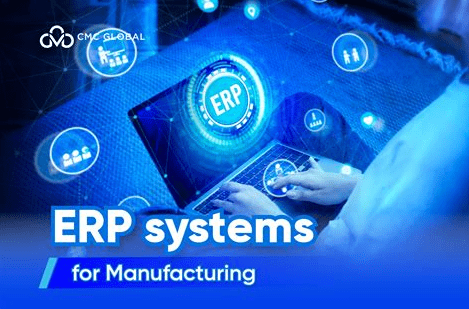Erp system for small manufacturing business
Welcome to the world of small manufacturing businesses, where efficiency is key to success. In order to streamline operations and maximize productivity, many small manufacturers are turning to ERP (Enterprise Resource Planning) solutions. These software systems are designed to integrate and automate essential business processes, from inventory management to financial tracking. By implementing an ERP solution, small manufacturers can boost efficiency, reduce costs, and ultimately increase their bottom line. Let’s explore how ERP solutions are transforming the way small manufacturing businesses operate.
Benefits of Implementing ERP System in Small Manufacturing Businesses
Implementing an Enterprise Resource Planning (ERP) system in a small manufacturing business can bring a myriad of benefits, ultimately leading to increased efficiency, productivity, and overall success. Here are some of the key advantages of integrating an ERP system into your operations:
Streamlined Processes: One of the biggest advantages of an ERP system is the ability to streamline and automate various processes within the organization. By centralizing data and information into a single system, employees can easily access real-time data, collaborate with other departments, and make more informed decisions. This leads to a more efficient workflow and reduces the risk of errors and duplications.
Improved Visibility: With an ERP system, small manufacturing businesses can gain better visibility into their operations. Managers can track inventory levels, monitor production schedules, and analyze performance metrics in real-time. This enhanced visibility allows for better decision-making, improved forecasting, and ultimately, increased profitability.
Enhanced Communication: Communication is key in any business, and an ERP system can help facilitate better communication between departments, suppliers, and customers. With a centralized system in place, everyone has access to the same data and information, leading to increased collaboration and efficiency. This also helps reduce misunderstandings and delays in communication, ultimately improving customer satisfaction.
Cost Savings: While implementing an ERP system may require an initial investment, the long-term cost savings can be significant. By streamlining processes, reducing manual errors, and improving visibility, small manufacturing businesses can save money on operational costs and increase overall profitability. Additionally, an ERP system can help identify areas for improvement and cost-cutting measures, leading to long-term savings.
Scalability: As a small manufacturing business grows, it is important to have systems in place that can scale with the business. An ERP system is designed to grow with your organization, making it easy to add new users, expand functionality, and adapt to changing business needs. This scalability ensures that your business can continue to operate efficiently and effectively as it grows.
Compliance and Security: Small manufacturing businesses are often subject to industry regulations and data security requirements. An ERP system can help ensure compliance with these regulations by providing audit trails, data encryption, and access controls. This not only helps protect sensitive data and information but also provides peace of mind for both the business and its customers.
Overall, implementing an ERP system in a small manufacturing business can have a significant impact on operations, efficiency, and profitability. By streamlining processes, improving visibility, enhancing communication, and ensuring compliance, an ERP system can help small businesses compete in today’s fast-paced market and set them up for long-term success.
Key Features to Look for in an ERP System for Small Manufacturing Businesses
When it comes to choosing an ERP system for your small manufacturing business, there are several key features that you should look for to ensure that the system meets your specific needs. One important feature to consider is inventory management functionality. A good ERP system should be able to track all of your raw materials, work-in-progress, and finished goods in real-time, allowing you to optimize your inventory levels and reduce the risk of stockouts. Additionally, the system should have the ability to generate accurate and timely reports on inventory levels, orders, and sales, helping you make informed decisions about your production and purchasing processes.
Another crucial feature to look for in an ERP system is production planning and scheduling tools. These tools can help you effectively plan and track your production schedules, ensuring that you are able to meet customer demand while minimizing waste and inefficiency. The system should also have the ability to automatically generate production schedules based on factors such as order lead times, machine availability, and labor resources, helping you optimize your production processes and maximize efficiency.
Quality control and compliance features are also important considerations when choosing an ERP system for your small manufacturing business. The system should have robust quality control tools that allow you to track and monitor the quality of your products at every stage of the production process, helping you identify and address any issues before they reach your customers. Additionally, the system should have compliance tracking functionality that allows you to easily generate reports and documentation to demonstrate your compliance with industry regulations and standards.
Integration with other business systems is another key feature to look for in an ERP system. A good ERP system should be able to seamlessly integrate with your existing accounting, CRM, and supply chain management systems, allowing you to streamline your processes and eliminate manual data entry and reconciliation. The system should also have the ability to provide real-time data synchronization between all of your systems, ensuring that you always have access to the most up-to-date information.
Finally, ease of use and scalability are important factors to consider when choosing an ERP system for your small manufacturing business. The system should be intuitive and easy to learn, allowing your employees to quickly adapt to the new software and start using it effectively. Additionally, the system should be scalable, allowing you to easily add new users, modules, and functionalities as your business grows and evolves.
Cost-effective ERP Solutions for Small Manufacturing Businesses
When it comes to implementing an ERP system for a small manufacturing business, cost-effectiveness is a crucial factor to consider. Small businesses often have limited budgets and resources, so finding an ERP solution that offers the right balance of affordability and functionality is essential. Here are some cost-effective ERP solutions that are ideal for small manufacturing businesses:
1. Cloud-based ERP Systems: Cloud-based ERP systems are a popular choice for small manufacturing businesses because they offer a cost-effective solution that doesn’t require a large upfront investment. With a cloud-based ERP system, you can access your data and software through the internet, eliminating the need for expensive on-premise servers and hardware. This not only reduces the initial costs of implementation but also lowers ongoing maintenance and IT costs.
2. Open-source ERP Systems: Open-source ERP systems are another cost-effective option for small manufacturing businesses. These systems are typically free to use and can be customized to suit your specific business needs. While open-source ERP systems may require more technical expertise to implement and maintain, they can offer significant cost savings in the long run. Additionally, many open-source ERP systems have a supportive online community that can provide assistance and resources.
3. Scalable ERP Solutions: When choosing an ERP solution for a small manufacturing business, it’s important to select a system that is scalable. Scalability refers to the ability of the ERP system to grow and adapt as your business expands. By choosing a scalable ERP solution, you can start with basic features and functionalities and add more advanced capabilities as your business grows. This not only helps to keep costs down initially but also ensures that your ERP system can continue to meet your needs in the future.
4. Subscription-based Pricing: Many ERP vendors offer subscription-based pricing models that can make it easier for small manufacturing businesses to afford an ERP system. With a subscription-based pricing plan, you pay a monthly or annual fee for access to the ERP software and services. This can help to spread out the costs of implementation and make it more manageable for businesses with limited budgets. Additionally, subscription-based pricing often includes updates and support services, eliminating the need for additional expenses.
5. Implementation Partnerships: Some ERP vendors offer implementation partnerships with third-party consultants or resellers that can help small manufacturing businesses with the setup and customization of their ERP system. These partnerships can provide access to specialized expertise and resources that may not be available in-house, making the implementation process more efficient and cost-effective. By leveraging the knowledge and experience of implementation partners, small manufacturing businesses can ensure a successful ERP implementation without breaking the bank.
Case Studies: Successful Implementation of ERP in Small Manufacturing Businesses
ERP systems have become increasingly popular among small manufacturing businesses as they strive to improve efficiency, productivity, and overall business management. In this article, we will explore some case studies of successful ERP implementation in small manufacturing businesses.
Case Study 1: XYZ Manufacturing
XYZ Manufacturing is a small family-owned business that specializes in producing custom metal parts for various industries. They were facing issues with inventory management, production scheduling, and order tracking, which were causing delays and inefficiencies in their operations. After evaluating different ERP systems, they decided to implement a cloud-based ERP solution tailored to their specific needs. The ERP system helped them streamline their processes, improve visibility across departments, and automate manual tasks. As a result, they were able to reduce lead times, optimize inventory levels, and increase customer satisfaction.
Case Study 2: ABC Electronics
ABC Electronics is a small electronics manufacturing company that was struggling with outdated software systems and manual processes. They were experiencing bottlenecks in their production line, errors in order processing, and lack of real-time data for decision-making. After conducting a thorough analysis of their business processes, ABC Electronics chose to implement an ERP system that integrated with their existing systems and provided a centralized platform for managing all operations. The ERP system allowed them to better forecast demand, track inventory levels, and improve production efficiency. As a result, they were able to reduce costs, increase productivity, and scale their business effectively.
Case Study 3: LMN Furniture
LMN Furniture is a small furniture manufacturing company that was facing challenges in managing their supply chain, tracking production costs, and analyzing profitability. They realized the need for a comprehensive ERP solution to streamline their operations and improve business performance. After careful evaluation, they implemented an ERP system that integrated modules for inventory management, production planning, and financial reporting. The ERP system provided real-time insights into their business operations, enabling them to make data-driven decisions and allocate resources more efficiently. With the help of the ERP system, LMN Furniture was able to reduce waste, improve production quality, and achieve higher profitability.
These case studies demonstrate the positive impact of ERP systems on small manufacturing businesses, helping them overcome challenges, improve operational efficiency, and achieve sustainable growth. By leveraging the power of ERP technology, small manufacturers can streamline their processes, enhance collaboration among departments, and stay competitive in today’s rapidly changing market.
Steps to Implementing ERP System in Small Manufacturing Businesses
Implementing an ERP system in a small manufacturing business can be a daunting task, but with proper planning and execution, it can lead to significant improvements in efficiency and productivity. Here are some steps to guide you through the process:
1. Assess Your Current Business Processes: The first step in implementing an ERP system is to assess your current business processes. Identify areas where you are facing challenges, whether it’s inventory management, production scheduling, or customer relationship management. Understanding your current processes will help you determine what features you need in an ERP system to address these challenges.
2. Set Clear Goals and Objectives: Before selecting an ERP system, it’s important to establish clear goals and objectives for the implementation. Do you want to streamline your production process, improve inventory accuracy, or enhance customer service? Clearly defining your goals will help you choose the right ERP system that aligns with your business objectives.
3. Choose the Right ERP System: When selecting an ERP system for your small manufacturing business, consider factors such as cost, scalability, user-friendliness, and industry-specific features. Look for a system that offers modules for inventory management, production planning, and supply chain management, as these are crucial for manufacturing businesses.
4. Develop a Implementation Plan: Once you have chosen an ERP system, develop a detailed implementation plan that includes timelines, budget, resource allocation, and training requirements. Assign roles and responsibilities to ensure that the implementation process runs smoothly and stays on track.
5. Conduct Training and Provide Ongoing Support: Training is a crucial aspect of implementing an ERP system in a small manufacturing business. Ensure that your employees receive proper training on how to use the system effectively. Provide ongoing support to address any issues or questions that may arise during the implementation process. Encourage feedback from employees to identify areas for improvement and make necessary adjustments.
By following these steps, you can successfully implement an ERP system in your small manufacturing business and reap the benefits of improved efficiency, productivity, and customer satisfaction. Remember, the key to a successful ERP implementation is proper planning, clear communication, and ongoing support for your employees.






